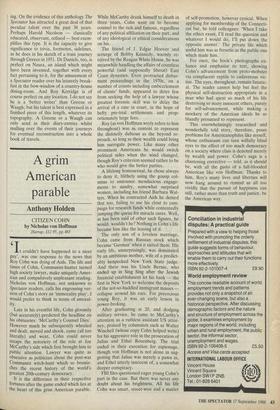A grim American parable
Anthony Holden
CITIZEN COHN by Nicholas von Hoffman
Harrap, £12.95, pp.483
t couldn't have happened to a nicer guy', was one response to the news that Roy Cbhn was dying of Aids. The life and times of Cohn, Communist-hunter turned high society lawyer, make uniquely Amer- ican and compulsively unpleasant reading. Nicholas von Hoffman, not unknown to Spectator readers, calls his engrossing ver- sion of Cohn's story an 'immorality play'. I would prefer to think in terms of amoral- ity.
Late in his eventful life, Cohn gloomily (but accurately) predicted the headline on his obituaries: 'McCarthy's Counsel Dies'. However much he subsequently wheeled and dealt, moved and shook, came (all too literally) and went, Cohn could never escape the notoriety of the role at Joe McCarthy's side which first brought him to public attention. Lawyer was quite as obsessive as politician about the post-war Communist witch-hunt which so besmir- ches the recent history of the world's greatest 20th-century democracy.
It is the difference in their respective fortunes after the game ended which lies at the heart of this grim American parable. While McCarthy drank himself to death in three years, Cohn went on to become counsel to the rich and famous, regardless of any political affiliation on their part, and of any ideological or ethical considerations on his.
The friend of J. Edgar Hoover and scourge of Bobby Kennedy, warmly re- ceived by the Reagan White House, he was meanwhile handling the affairs of countless powerful (and supposedly liberal) East Coast dynasties. Even protracted disbar- ment proceedings in the 1970s, on a number of counts including embezzlement of clients' funds, appeared to deter few from seeking the help of a lawyer whose greatest forensic skill was to delay the arrival of ,a case in court, in the hope of hefty pre-trial settlements and prop- ortionately large fees.
Roy (as von Hoffman wryly refers to him throughout) was as content to represent the distinctly dubious as the beyond re- proach, so long as their wealth could bring him surrogate power. Like many other prominent Americans he would switch political sides when the wind changed, though Roy's criterion seemed rather to be who would give the better parties.
A lifelong homosexual, he chose always to deny it, blithely using the gossip col- umns to announce mendacious engage- ments to sundry, somewhat surprised women, including his friend Barbara Wal- ters. When he contracted Aids he denied that too, failing to use his clout to cam- paign for research funds while contentedly jumping the queue for miracle cures. Well, as has been said of other such figures, he would, wouldn't he? Nothing in Cohn's life became him like the leaving of it.
The only son of a loveless marriage, Cohn came from Russian stock which became 'German' when it suited them. His early life, unsurprisingly, was dominated by an ambitious mother, wife of a predict- ably henpecked New York State judge. And there was his Uncle Bernie, who ended up in Sing Sing after the Jewish financial, establishment let his bank — the first in New York to welcome the deposits of the not-so-huddled immigrant masses collapse around his ears. For precocious young Roy, it was an early lesson in power-broking.
After graduating at 20, and dodging military service, he came to McCarthy's attention as a ruthless assistant US attor- ney, praised by columnists such as Walter Winchell (whose copy Cohn helped write) for his aggressive role in the prosecution of Julius and Ethel Rosenberg. The trial ended in their execution for espionage, though von Hoffman is not alone in sug- gesting that Julius was merely a pawn in, and Ethel utterly innocent of, a somewhat deeper conspiracy.
FBI files questioned eager young Cohn's part in the case. But there was never any doubt about his brightness. All his life Cohn was smart, street-wise and a master of self-promotion, however cynical. When applying for membership of the Connecti- cut bar, he told colleagues: 'When I take the ethics exam, I'll read the question and whatever I would do, I'll put down the opposite answer.' The private life which undid him was as frenetic as the public one which made him.
For once, the book's photographs en- hance and emphasise its text, showing Cohn's advancement from proto-mobster via complacent reptile to cadaverous vic- tim. The eyes, throughout, remain fanatic- al. The reader cannot help but feel the physical self-destruction appropriate in a man who had spent so much of his life destroying so many innocent others, purely for self-advancement, while making a mockery of the American ideals he so blandly presumed to represent.
This overwhelmingly researched and wonderfully told story, therefore, poses problems for Americanophiles like myself, whose enthusiasm can turn wilfully blind eyes to the effect of too much democracy on a society where class is denoted merely by wealth and power. Cohn's saga is a chastening corrective — told, as it should be, with all the gusto of a full-blooded American like von Hoffman. Thanks to him, Roy's many lives and liberties will now hang around to remind us all too vividly that the pursuit of happiness can still, rather more than truth and justice, be the American way.


































































 Previous page
Previous page